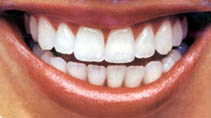|
|
|
![]()
Dental Outlook # 7
© Tomás Seif R. Odontólogo Universidad Central de
Venezuela Master of Science The University of Michigan,
USA e-mail: tseif@cantv.net,
Office numbers: (58-2) 992.02.42, 992.54.31,
992.78.09
Welcome to this section of the Dental Column.
Hopefully all our readers will enjoy it and have the opportunity to learn about the exciting advances and technologies that modern dentistry has to offer.
Do you have sensitive teeth?
If your teeth become sensitive to brushing, flossing, heat, cold or certain foods, the discomfort can interfere with your enjoyment of daily activities.
|
You may have a common problem called dentin hypersensitivity, or "sensitive" teeth. |
|
 |
Before treating you for sensitive teeth, however, your dentist will first make sure that there are no underlying dental problems causing the discomfort such as a cavity, tooth grinding, or a dying or fractured tooth.
Causes of sensitivity
Teeth become sensitive when the dentin (the tooth layer covered by enamel under the crown and by cementum under the root) becomes exposed. The microscopic tubules (small hollow tubes) found in dentin are then exposed, allowing sensations of heat and cold or acidic foods to stimulate the nerves and cells within the tooth. This causes hypersensitivity (excessive sensitivity).
Cementum may become exposed when gums recede due to age or gum disease. The result can be hypersensitivity near the gum line. Vigorous tooth brushing at the gum margin or tooth grinding can also cause the enamel to thin, exposing the cementum.
Treatment
Hypersensitivity can be treated. Your dentist may recommend an approach that can be tried at home, such as desensitizing toothpastes.
These toothpastes are often helpful. They contain compounds that help block transmission of sensation from the tooth surface to the nerve.
Desensitizing toothpastes, which usually contain stronium chloride or potassium nitrate, may require numerous applications before sensitivity is reduced. These products will either seal the exposed tubule openings or reduce the ability of the nerves to transmit pain. When choosing dental products, look for those that carry the A.D.A. (American Dental Association) Seal of Acceptance.
Your dentist may try some in-office techniques if desensitizing toothpastes are not helpful. Fluoride treatments may be applied to the sensitive areas of the teeth. The fluoride binds to the tooth and reduces the transmission of sensations through it. Fluoride strengthens the enamel by helping the damaged tooth to remineralize. Another agent that blocks the transmission of sensations is called oxalate. Accepted stronium chloride gels may also be topically applied to the teeth.
Another option is for your dentist to seal the sensitive areas with a number of dental materials. A sealant (a plastic material that's painted onto the teeth) or resin (a tooth colored restorative material) may be tried. If the sensitivity is a result of gum recession, your dentist may use materials (called dentin bonding agents) which are made to bond directly to the tooth root.
All this efforts will reduce your sensitivity and make your life a little more comfortable.
I am looking forward to update you with more interesting information about modern dentistry.
Es nuestro interés que la información incluida en esta página sea de su ayuda. Si tiene alguna pregunta puede envíarnos un correo electrónico, o si desea que incluyamos algún tópico en particular en esta sección puede contáctarnos a través de nuestro libro de visitas.
